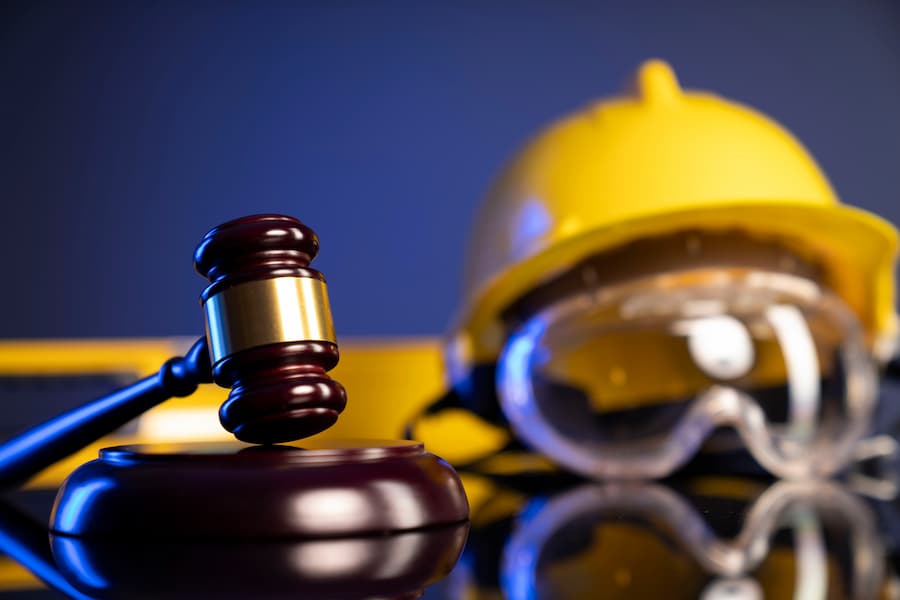What Are the Most Common Causes of Construction Accidents?

Construction workers perform essential jobs that provide us with places to live, work, and play. They also build the road, bridges, and other parts of our infrastructure that keep our country moving. Reach out to a Indianapolis construction accident lawyer.
Despite its importance, the construction industry is one of the most dangerous of all professions, and each year, thousands of construction workers suffer severe injuries and hundreds die because of construction accidents.
The following article addresses some of the most common causes of construction accidents.
Meanwhile, if you suffered serious injuries or lost a loved one in a construction accident, contact an experienced attorney immediately for a full review of your case and advice regarding your options for obtaining compensation.
Common Construction Accident Causes
 Some of the most common causes of construction accidents include:
Some of the most common causes of construction accidents include:
Falls
Falls are the leading cause of construction accidents. Falls from heights can occur from ladders, scaffolding, roofs, or other elevated areas. These accidents can happen due to a lack of fall protection, improper safety procedures, or inadequate training. In some cases, ladders and scaffolding fail due to improper installation or from failing to secure the apparatus.
Additionally, construction workers can trip over debris or loose electrical cords on the ground or slip on spilled liquid and fall. If a worker slips or trips from an elevated level, they could fall to the ground or lower levels of the structure, resulting in severe or life-threatening injuries. Even if you slip or trip and fall on a single level, you can still suffer sprains, fractures, severe head injuries, or spinal injuries.
Struck by Objects
Construction workers can sustain injuries from falling objects, such as tools, materials, or equipment. This can occur because of improperly secured or inadequately controlled objects dropped from heights during construction activities.
Caught In or Between Objects
Heavy machinery, equipment, or structures—such as moving parts of machinery, collapsing trenches or excavation sites, or machinery without proper safety guards—can trap construction workers..
Electrocutions
Construction sites often involve electrical wiring and equipment, increasing the risk of electrocution. Accidents can occur when workers touch exposed wiring, faulty electrical systems, or equipment that hit power lines.
Machinery Accidents
Operating heavy machinery and equipment can lead to accidents if workers and supervisors do not follow proper safety precautions. This includes accidents involving cranes, forklifts, bulldozers, excavators, and other construction machinery.
Equipment Malfunctions
Sometimes, a faulty component may fail, or a machine may break down due to lack of maintenance. When this occurs, it can cause a construction accident that seriously injures or kills those working on or around the equipment.
Overexertion and Repetitive Motion Injuries
Construction work often involves physically demanding tasks, such as lifting heavy objects, repetitive motions, or working in awkward positions. Overexertion and repetitive motion can lead to musculoskeletal injuries, including strains, sprains, and back injuries.
Lack of Proper Training and Safety Protocols
Insufficient training and failure to follow safety protocols can increase the risk of construction accidents. Workers should receive adequate training on equipment operation, fall protection, hazard recognition, and other safety procedures.
Hazardous Materials Exposure
Construction sites may involve handling hazardous materials such as asbestos, chemicals, or toxic substances. Accidents can occur if workers don’t follow proper safety measures, such as protective equipment and safe handling protocols.
Human Error and Negligence
Many times, human error causes construction accidents. This can include negligence by contractors, site supervisors, or other workers. Failure to follow safety guidelines, cutting corners, or disregarding safety precautions can lead to accidents and injuries.
Other situations can cause construction accidents as well. In nearly all cases, if supervisors prioritized safety, adhered to regulations and safety guidelines, provided proper training, and maintained a culture of safety awareness to mitigate the risk of construction accidents, they could have prevented the accident.
Who Can I Hold Responsible for My Construction Accident Injuries?
Responsibility for construction accident injuries can depend on the specific circumstances of the accident and the laws of the jurisdiction where the accident occurred.
Some parties that may bear responsibility for your construction accident injuries include:
- General contractor. If the construction site involves multiple subcontractors, the general contractor overseeing the project must maintain a safe work environment and coordinate safety measures among all subcontractors. You may hold them responsible for accidents resulting from their failure to fulfill this duty.
- Subcontractors. Subcontractors working on a construction site may also bear responsibility for the safety of other employees. If a subcontractor’s negligence or unsafe practices contributed to the accident and your injuries, you may hold them liable.
- Property owner. In some cases, you may hold the property owner where the construction is taking place responsible for ensuring a safe premises. This is particularly true if the property owner controls the construction activities or has a duty to maintain a safe property.
- Manufacturers and suppliers. If a defective product or equipment failure contributed to the accident, you could hold the manufacturer or equipment supplier liable for your injuries. This can include defective tools, machinery, safety gear, or materials.
- Architects and engineers. In certain situations, you may hold architects or engineers involved in the design or planning of the construction project liable for injuries that resulted from design defects or negligent planning.
Depending on the accident, you might hold other parties liable for the accident. These can include those responsible for transporting materials to and from the construction site or loading/unloading materials.
If you work in road construction and a negligent motorist struck and injured you, you may pursue compensation from them.
Consult an experienced construction accident lawyer for help. They can assess liability based on the applicable laws and pursue a claim for compensation for your injuries and damages.
What Compensation Can I Receive After a Construction Accident?
After a construction accident, you could receive compensation depending on the circumstances of the accident, the severity of your injuries, and the applicable laws in your state.
You may recover compensation for:
- Medical expenses. You can seek compensation for current and future medical expenses related to your construction accident injuries. This includes costs for hospital stays, surgeries, doctor visits, medications, rehabilitation, assistive devices, and any other necessary medical treatments.
- Lost income. If your injuries prevent you from working, you may recover compensation for your lost income. This can include both current and future lost income, as well as diminished earning capacity if your injuries have a long-term impact on your ability to work.
- Pain and suffering. You may obtain compensation for the pain, suffering, and emotional distress your injuries caused. This compensation, known as non-economic damages, addresses the physical and emotional hardships you experienced that do not have a readily determined dollar amount.
- Disability and disfigurement. If the construction accident resulted in a permanent disability or disfigurement, you may receive compensation for its impact on your quality of life and your ability to perform daily activities.
- Rehabilitation and therapy. You can seek compensation for the costs associated with rehabilitative therapies, such as physical therapy, occupational therapy, and psychological counseling. These therapies aid your recovery and maximize your functional abilities.
- Property damage. If the construction accident damaged your personal property, such as clothing, equipment, or vehicles you may recover compensation to repair or replace it.
- Wrongful death benefits. If a construction accident killed a close family member, you may pursue a wrongful death claim. This compensation can cover funeral expenses, loss of financial support, and compensation for the emotional toll of losing a family member.
An experienced construction accident attorney can identify all forms of compensation you can pursue and calculate the amounts you will need to cover all of your injuries and losses. A lawyer can file a claim and negotiate with the insurance company to get the maximum settlement possible. An attorney can also file a lawsuit for you and fight for your rights and interests in court if you can’t get the compensation you need through a settlement.
Will I File Workers’ Compensation or Third-Party Claim After a Construction Accident?
Whether you file a workers’ compensation claim or a third-party claim after a construction accident depends on the accident and the laws in your state.
Here’s a general explanation of these two types of claims:
- Workers’ compensation claim: Workers’ compensation insurance provides benefits to employees who suffer work-related injuries or illnesses. If you were injured while working as an employee on a construction site, you may file a workers’ compensation claim. Workers’ compensation typically covers medical expenses, a portion of lost income, and rehabilitation costs. In most cases, workers’ compensation is a no-fault system, meaning you can receive benefits regardless of fault for the accident.
- Third-party claim: In some situations, you may file a third-party claim in addition to a workers’ compensation claim. You file a third-party claim against a party other than your employer or co-workers who contributed to the accident. For example, if a subcontractor, equipment manufacturer, property owner, or other third party caused your injury, you may seek compensation through a third-party claim. Unlike workers’ compensation, a third-party claim allows you to seek damages for pain and suffering, which workers’ compensation won’t cover.
Consult a construction accident lawyer. They can assess your case and determine the appropriate course of action. An attorney can guide you through the process, evaluate what parties may bear liability, and navigate the complexities of filing a workers’ compensation claim or pursuing a third-party claim.
Contact an Experienced Construction Accident Attorney Today
You rely on your construction job to support yourself and your family, but you were not prepared to suffer injuries in a construction accident that kept you from working. You need compensation to cover your expenses, but you likely have many questions about the process.
Most construction accident attorneys offer free consultations, so you can discuss your claim with no risk.
Act quickly and contact a construction accident attorney as you will have limited time and strict deadlines to file your claim and pursue compensation. Call a personal injury attorney today to learn of your rights and options for getting the compensation you deserve.

